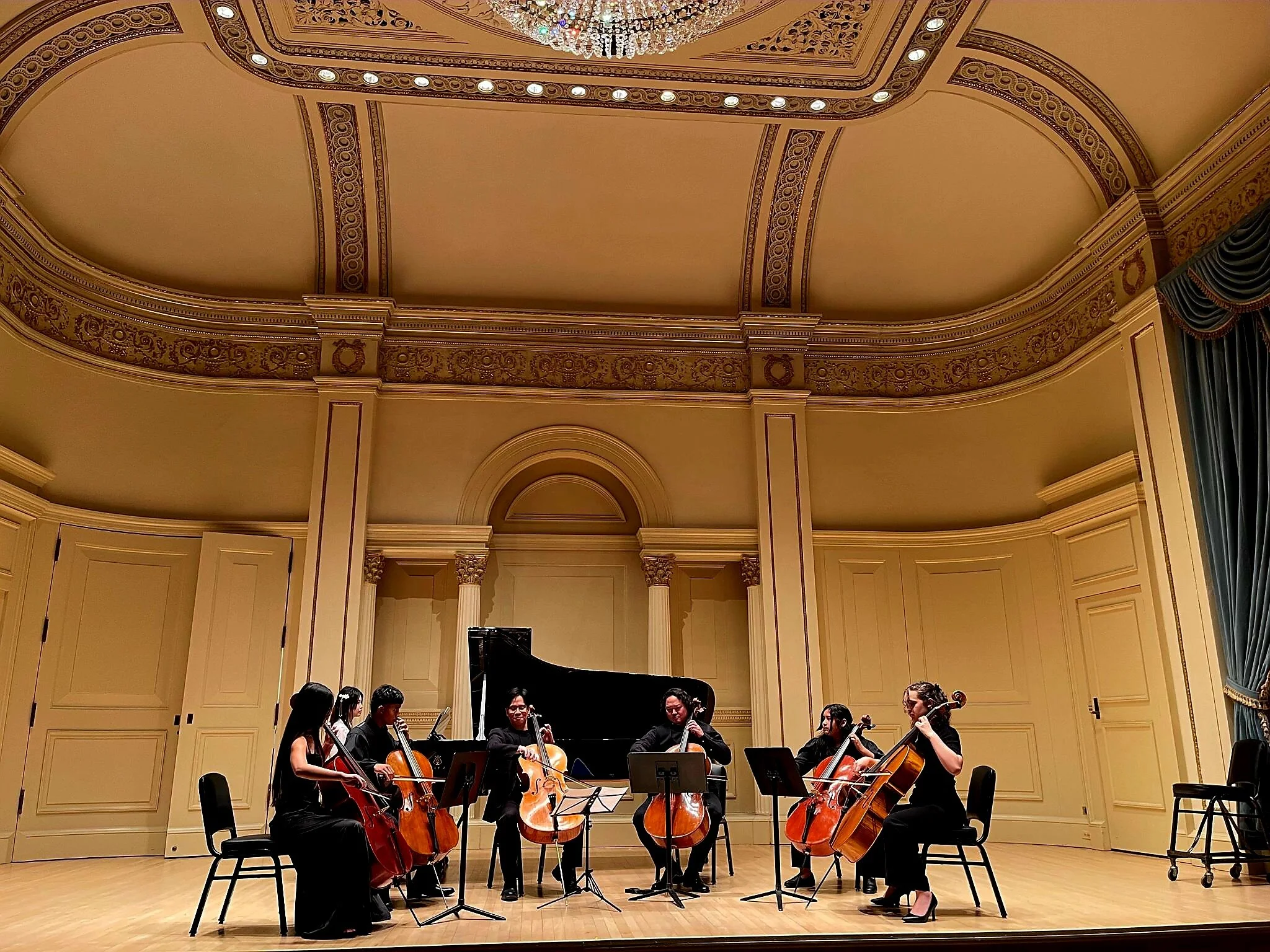How I Play, How I Teach
—Paul Tortelier—
Could you briefly talk about your teaching experience?
In 2004, I began my teaching career in Hong Kong, working with students across various age groups from elementary to high school levels. Upon moving to Texas in 2015, I took on the role of teaching assistant to Professor Jesús Castro-Balbi, where I taught students ranging from music minors to graduate performance majors. Additionally, I assisted in directing the TCU Cello Ensemble and arranged music for the group.
Afterward, I became a registered Suzuki cello teacher, and held a full-time position as Suzuki cello faculty at Greenville ISD for two years, working with students from kindergarten to 12th grade. Furthermore, I taught at several professional summer institutes, including the Texas Cello School, Clear Creek Music Festival, TCU Summer Cello Academy, and The Greater North Texas Youth Orchestra Summer Music Intensive.
Presently, I am a teaching artist at the Dallas Symphony Orchestra Young Musicians Program and hold a cello professor position at Tarrant County College (NE Campus) in Fort Worth. I am also establishing my own cello studio in Lewisville, where some of my students have excelled in competitions and secured places in all-region auditions.
Could you briefly talk about your musical training background?
I began my musical journey at the age of six at the Hong Kong Music Office, where I participated in group classes. I had the opportunity to play in several youth orchestras, taking on the role of principal cellist. As I progressed, I sought private instruction from Ms. Tung Hiu-lo, my first private teacher both during and after my college years. Another influential mentor in my life was Professor Ray Wang at the Hong Kong Academy for Performing Arts, whose guidance left a lasting impact on me.
Subsequently, I had the privilege of studying under the renowned cellist Professor Jesús Castro-Balbi for seven years. His teaching, influenced by his own mentors János Starker and Aldo Parisot, greatly shaped my musical development. Additionally, I received valuable coaching from esteemed cellists such as Johannes Moser, Lynn Harrell, Steven Isserlis, Vagram Saradjian, Dmitri Atapine, Maja Bogdanovic, and Li-Wei Qin.
I firmly believe that learning is a lifelong journey. Even today, I continue to learn from my colleagues, friends, and most importantly, my students, who inspire me to grow and evolve as a musician and educator.
When do you think is the best age to start learning cello?
In my experience, the optimal age for beginning cello lessons is typically between 3rd and 6th grade. However, this can vary significantly depending on the individual student's physical and mental development. I've had diverse experiences with students starting at different ages: one began in 1st grade and progressed through Suzuki Book 5 in just two years, while another started at 48 and completed Suzuki Book 8 within a year. The crucial factors for success are the student's attitude and consistent daily practice.
Do you teach in other languages?
Of course, I teach in English. Cantonese is my mother language, and I also speak Mandarin.
How would you describe your teaching method?
First of all, I believe every student has the potential to become a cello lover. My teaching method is deeply rooted in my experiences and beliefs, tailored to cater to the unique needs of different types of cello students: beginners, transfer students, and what I call 'apprentice' students.
For beginners, particularly young children, I draw from my training as a Suzuki cello teacher under Dr. Alice Ann M. O'Neill. I focus on building fundamental techniques through imitation, ensuring that students develop a strong technical foundation. I also actively involve parents in the learning process, as their support plays a crucial role in a child's musical journey.
Transfer students, who may come with previous training or experiences, require a different approach. Drawing from my own background of overcoming challenges due to limited resources and inadequate early teaching, I guide transfer students through changes, rebuilding techniques, and expanding their repertoire. My firsthand experience of rectifying bad habits allows me to understand and address their needs effectively.
The 'apprentice' students, whom I view as partners in a musical journey, receive personalized attention to develop their musical and life skills. I prioritize building relationships with these students, understanding their beliefs and aspirations, and providing them with opportunities for professional playing experiences. I have been fortunate to guide students to perform at prestigious venues, fostering their growth as musicians.
Beyond technical and musical development, I emphasize the importance of authentic music performance and spiritual growth. As a Christian, I believe in performing music authentically, reflecting the true personality of the cellist. I view musical development, especially at an advanced level, as intertwined with spiritual development. I aim to cultivate well-rounded individuals who are passionate about cello playing and disciplined in their approach, drawing them closer to their spiritual beliefs.
Do you teach anything other than cello?
I teach young kids music theory occasionally; and teach college students Music Appreciation Class at Tarrant County College. I also coach youth orchestras. Besides, I’m a youth Sunday School teacher at my church.



